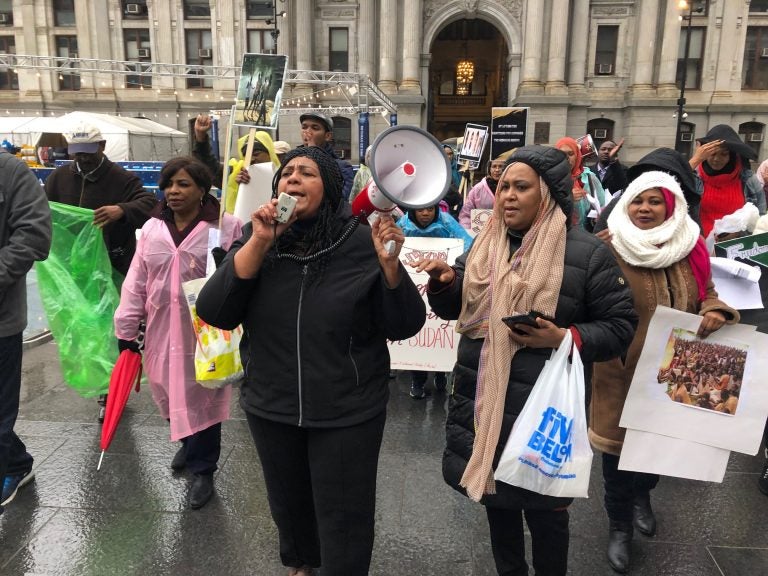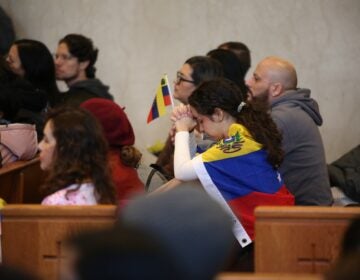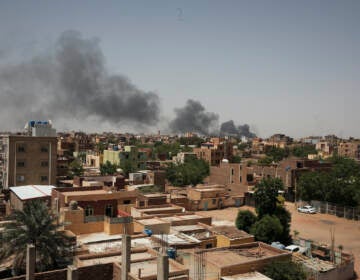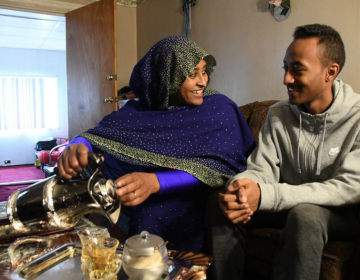Philly area Sudanese community protests in solidarity with demonstrators in Khartoum
“Our people right now are starving, are dying on the street, are dying in the hospital because there is no medicine,” said Ahmed Ali of Upper Darby.

More than two-dozen members of the local Sudanese community showed their support for protestors in Khartoum on Saturday with a demonstration at Philadelphia City Hall to raise awareness and encourage people to write their U.S. representatives. (Darryl C. Murphy/WHYY)
Thousands took to the streets in the Sudanese capital Sunday to call on President Omar al-Bashir to step down, the latest in nearly three weeks of demonstrations against his 29-year autocratic rule, which as been characterized by corruption and crippling economic hardship.
In Philadelphia, more than two-dozen members of the local Sudanese community showed their support for the movement on Saturday with a demonstration at City Hall to raise awareness and encourage people to write their U.S. representatives, asking them to take action.
“Here in Philadelphia, we have a big community,” said Ahmed Ali of Upper Darby.
According to the 2017 Census numbers, 740 people in Philadelphia reported having only Sudanese ancestry, though the margin for error is +/-553. Ali said he has friends who are protesting in Sudan. “We decided to support our families. Our families, our country. We want it to be a good country.”
“Our people right now are starving, are dying on the street, are dying in the hospital because there is no medicine,” he added.
The coalition of demonstrators are trying to contact U.S. officials, Ali said, but in the meantime, they will continue “gathering in front of City Hall, because this is the only thing we have right now.”
“We’ll keep doing our protest until that bloody criminal terrorist steps down,” Ali said.
The protests in Sudan began in December due to economic unrest, which caused the price of bread to triple overnight, according to NPR.
Protesters gathered at several points across Khartoum before they began to march on al-Bashir’s Nile-side palace in the city center. They chanted: “Freedom, peace and justice; Revolution is the people’s choice.”
Police used tear gas to disperse the protesters, who would regroup and resume the march only to be attacked by tear gas again. A video clip shared by activists online purported to show policemen chasing protesters as they pointed their tear gas guns skyward before firing them. Another clip showed protesters running away from the police, seeking shelter in side streets to avoid arrest and the tear gas.
“I am fully confident that we will succeed in bringing down this regime and live the life that we deserve,” said Mohammed, an unemployed 25-year-old who declined to give his full name for fear of reprisals.
“My confidence comes from the fact that most protesters are young and persistent like me,” he said after screaming at fellow protesters not to run away from the tear gas.
Another activist, Romaisa, 40, was out of breath as she ran to escape arrest. “We will triumph at the end despite the excessive use of violence and because we insist on demonstrating,” she said. She also declined to give her full name for fear of arrest.
Police have meanwhile arrested at least five Khartoum university lecturers after they staged a brief, on campus protest Sunday in solidarity with the demonstrators, according to activists reached in the Sudanese capital. Authorities have detained scores of activists and opposition leaders during the last two weeks.
Al-Bashir, an Islamist, has been in power since he led a military coup 29 years ago. He has shown no signs that he might step down anytime soon and continues to blame the country’s problems on international sanctions and plots against its Islamic “experience.” His rule has been defined by turmoil and conflict while the economy lurched from one crisis to another. The secession of the mostly animist and Christian south of the country in 2011 deprived Sudan of about three quarters of the country’s oil wealth.
The 74-year-old leader has spoken in public on at least five occasions since the start of the protests, initially sparked by worsening economic conditions but soon shifted to calls for al-Bashir to quit.
He has used his speaking engagements to try and placate the Sudanese, promising them better days ahead and seeking to justify on religious grounds the killing of protesters — up to 40 have reportedly died.
In addition to using violence to quash the protests, authorities have imposed emergency laws and nighttime curfews in some cities and suspended classes at schools and universities across much of Sudan. Internet sites have also been blocked and journalists are barred from covering the protests on the streets.
WHYY is your source for fact-based, in-depth journalism and information. As a nonprofit organization, we rely on financial support from readers like you. Please give today.





